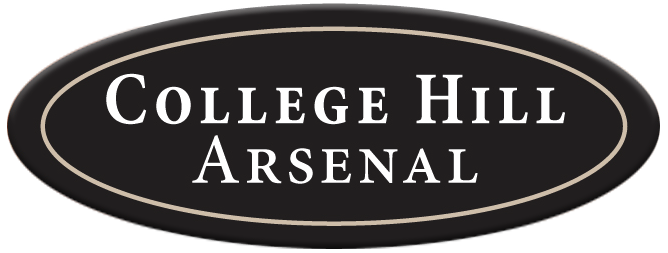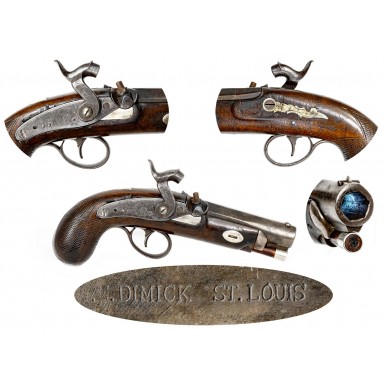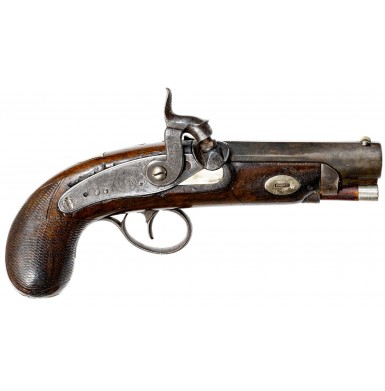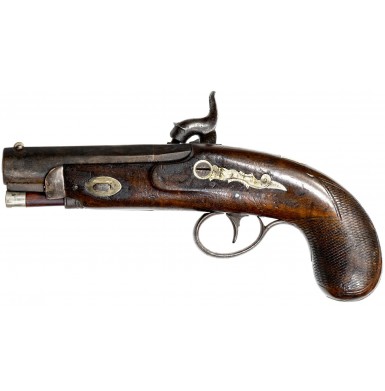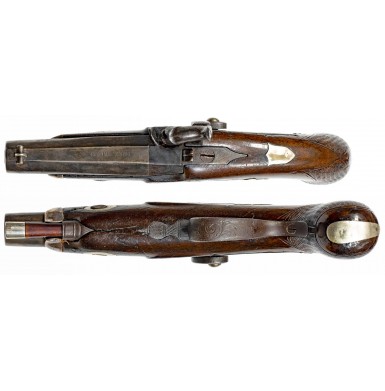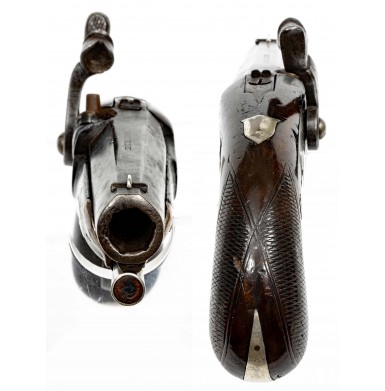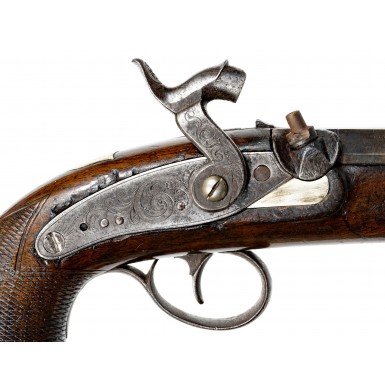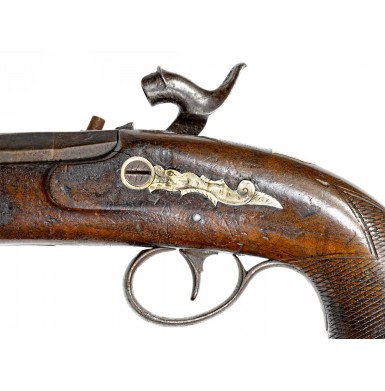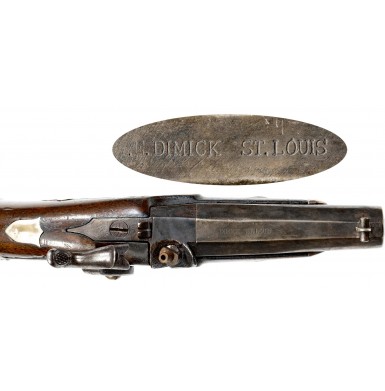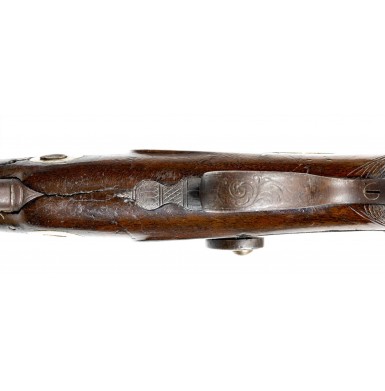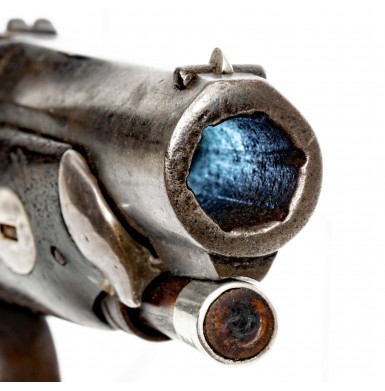Rare HE Dimick St. Louis Marked Derringer by FH Clark of Memphis
- Product Code: FHG-2256-SOLD
- Availability: Out Of Stock
-
$2,895.00
This is a solid example of a scarce, antebellum “southern” derringer that is retailer marked by Horace E. Dimick of St. Louis, but most likely produced by FH Clark & Company of Memphis, TN. Horace Dimick (1809-1873) was born in Vermont and entered the gunmaking business sometime around 1839 when he was living in Lexington, KY. About 1849, Dimick moved west to St. Louis, which was the most important point of departure for those moving west during that period. St. Louis was the hub of western migration at the time and many adventurers and families acquired their supplies for the journey in St. Louis. Of those acquisitions, one of the most important was certainly at least one firearm. During this period some of the most famous gunmakers of the period were working in St. Louis, among those the Hawken brothers. Dimick became a very well-known, high quality gun maker during this period, and by 1860 was employing at least 27 gunsmiths in his shop. Dimick came to national prominence during the opening months of the Civil War, when his firm provided an order of rifles for use by the famous Birge's Western Sharpshooters, eventually designated the 14thMissouri Volunteers (Western Sharpshooters) and finally the 66th Illinois Volunteer Infantry. Birge’s Sharpshooters are often considered the Western Theater counterpart to the famous Berdan Sharpshooters in the Army of the Potomac. In addition to making guns, Dimick’s firm also retailed a large number of guns from other makers. These included imported shotguns from Belgium and England, as well as sporting rifles and pistols from American and foreign sources as well. Like many such shops of the period, Dimick also sold a wide variety of outdoor and sporting type goods and equipment, from hunting accessories to fishing tackle.
Dimick offered small pocket percussion pistols in his shop for discreet carry and self-defense. These pistols were known as derringers, after the most famous maker of this type of pistol, Henry Deringer of Philadelphia. Based upon research by long time collectors and authors like L. Doug Eberhart, it has been determined that the most often encountered Dimick marked derringer variants were actually southern made guns, produced by F.H. Clark & Company of Memphis, TN. FH Clark & Company was a diverse company, operating as a firearms retailer and manufacturer, as well as a provider of a wide array of high-end goods. Most sources note the dates that they were in business as 1848 to 1866. Their 1850 catalog noted that they offered: “Guns, Watches, Silver-ware, Jewelry, Fancy Good &c” all for sale at their Gun Emporium. From their promotional literature it appears that FH Clark sought to be the “Bass Pro Shop” of the antebellum south, and maintained a large selection of shotguns, rifles and pistols for sale, along with all of the necessary accessories and accompaniments. Clark also offered gunsmithing services. They noted in their catalog that regarding their long guns that:
“It is impossible to give a list of the variety in our stock, while our prices will range for:
Double-barrel Shot-guns, from $8.00 to $200.00
Single-barrel Shot-guns, from $8.50 to $15.00
Rifles, from $8.00 to $75.00
Rifle and Shot-gun combined, from $20.00 to $60.00.
The catalog notes that Shotguns by Manton and rifles by Wesson were available for sale. Under the pistol section they offered “The genuine Deringer, assorted sizes” as well as “The English derringer, assorted sizes and quality.”. They also noted that they offered “A great variety of single-barrel Pistols-some with guards for the California trade.” and additionally offered Colt, Wesson, Allen, Blunt & Syms and a variety of imported pistols by name. The catalog goes on to list Gold Watches from $20 to $250 and Silver watches from $5 to $60 each. The catalog also offered silverware, German silver (silver plate), Britannia Ware, spectacles, clocks, lamps, Japanned tea sets, a variety of pocket, table and kitchen cutlery and razors. While it is well known that Clark offered “derringer” pocket pistols produced by Henry Deringer of Philadelphia, and agent marked by Clark, it is less well known that he offered imported derringer style handguns and produced his own copies of the famous pocket pistol. Collectors refer to the derringer style pistols produced by Clark as “Clark Clark’s” indicating that he manufactured them, as opposed to the guns produced by other makers that Clark only put his retailers name on. Collectors consider these to be the most desirable of the Clark marked pocket pistols, as they are actually southern made, and appear to have been made in much smaller numbers than the guns that Clark retailed from Deringer and from British and Belgian makers. Even more desirable are the derringers made by Clark, but retailer marked by Dimick as they fall into both the categories of “southern derringers” and “St. Louis” or westward expansion arms for collectors of mid-19th century American firearms.
Offered here is an about VERY GOOD condition example of a Dimick Marked FH Clark Made Derringer; a scarce and desirable St. Louis retailer marked and Memphis manufactured pistol. The gun is very much in the style of those manufactured by Henry Deringer but shows slightly cruder craftsmanship and none of Deringer’s marks or trademarks. In his seminal work Southern Derringers of the Mississippi Valley, early derringer collector and researcher Turner Kirkland (founder of Dixie Gunworks) shows two nearly identical FH CLARK marked derringers to this one. They are figures #217 and #268. His Dimick marked example is different from this one, but almost certainly was sourced from a different maker than Clark.
This gun is marked in one line on the top of the 3 5/8” tapered octagon to round barrel:
H.E. DIMICK ST. LOUIS
The “H” is barely visible in the mark, with the “E” quite weak as well. The balance of the marking is fully legible. The pistol is nominally .45 caliber, measured groove to groove, or about .42-.43 caliber land to land and is rifled with 6 grooves. The pistol is about 7 3/8” in overall length with a graceful, rounded bag shaped grip. Like Henry Deringer’s pistols, the gun has a simple back action lock and a rudimentary notched rear sight on the breech. The barrel is secured to the gun with a single screw through the breech tang and a wedge through the stock. The pistol is appointed with German silver mountings on the butt, forward of the lock, serving as wedge escutcheons, and as the forend cap. Like many single shot pistols of the period, a German silver shield is inset in the wrist of the pistol, where the owner could have his name or initials engraved. The triggerguard and entry pipe are of iron, typical of Clark produced guns. The pistol is lightly engraved with open foliate motifs on the lock, hammer, triggerguard and breech tang. The lock of the pistol has a dusky bluish patina, with the barrel having a more mottled, brownish-gray patina. The metal is mostly smooth, with some scattered light surface oxidation and minor flash pitting around the breech area. The action of the pistol functions correctly on all positions and is mechanically very good. The hammer fall is a little weak, suggesting that the tumbler might be binding on the wood of the stock somewhat. The lock is secure by a single screw which passes through a ribbon shaped German silver escutcheon side plate that is engraved in the form of an Asian dragon. The hammer screw appears to be a replacement, but everything else appears original to the gun. The bore of the pistol rates about GOOD. It is dark and dirty with scattered pitting along its length. A good scrubbing might improve the condition of the bore. The German silver fittings show light to moderate amounts of surface tarnish and are slightly dull. The pinned decorative German silver butt inlay is cracked near the tapered point on the rear of the grip, about ½” from the end. As the crack is between two pins that secured the piece, it remains tightly attached to the wood. What appears to be the original wooden ramrod with German silver end cap is present under the barrel of the pistol. The stock of the pistol is in about GOOD+ condition. The stock remains complete, full-length and essentially solid. The checkered grip area is worn with some of the checkering somewhat smooth, indicating that the pistol was carried quite a bit, likely in the coat pocket of an upper class southerner or possibly a riverboat gambler. There are a couple of grain cracks present, the most noticeable one being about 1” long on the bottom of the forend, running from the entry pipe to the triggerguard final. A much smaller one runs from the front of the reverse wedge escutcheon to the nose cap and there is a tiny crack at the lock mounting screw as well. There is also some minor chipping around the lock mortise, likely from improper lock removal. Despite the wear and minor damage to the stock it remains very attractive and is all typical of a pocket pistol that probably had an interesting life in the American West during the decade before and possibly after the American Civil War.
Overall this is an attractive and rather scarce example of a real southern made derringer pocket pistol from the famous F.H. Clark company of Memphis, TN, retailed by the more famous Horace E. Dimick of St. Louis, MO. Every collection of Civil War era arms needs to have at least one derringer style pocket pistol and a lovely southern made, likely antebellum gun would be a great pistol to fill that niche. This pistol is 100% complete and correct in every way with the exception of the replaced hammer screw. Although it clearly saw some moderate use and carry, it was never really abused. It would be wonderful to know about the adventures this pistol may have had in the St. Louis area, residing in the pocket of a someone who might have been moving west, been a businessman in St. Louis or possibly even riding the Mississippi river in the vest pocket of a gambler. No matter who originally owned it, you have a chance to own a great piece of southern and western American history, all in one pistol.
SOLD
Tags: Rare, HE, Dimick, St., Louis, Marked, Derringer, by, FH, Clark, of, Memphis
